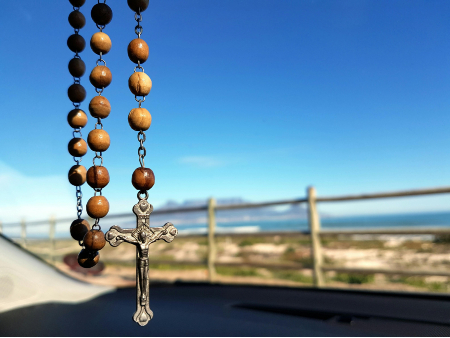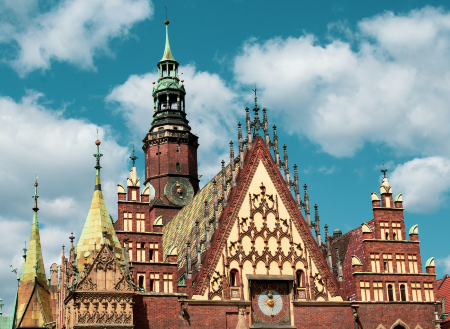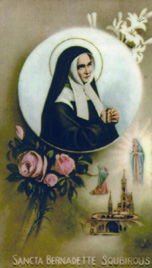The Gospel of Work
FREE Catholic Classes
© Third Millennium, LLC
By Deacon Keith A. Fournier
Pope John Paul II recently addressed an assembly of the leaders of the "Catholic Action" movement in Italy on the "gospel of work". He proclaimed a theme that is one of the many profound contributions of his extraordinary pontificate, the true meaning and redemptive value of all human work.
In 1981 he authored an encyclical letter titled "On Human Work" that has received little emphasis. We live in an age that has lost its understanding of the Christian meaning of work, that is that work, redeemed by and joined to the work of the Lord is filled with redemptive value! The detachment of work from its true value and the separation of its place as an intricate part of the purpose of our lives is not a new problem. It is a part of a larger social and individual malady. It is one of the bad fruits of the rupture of human integrity and solidarity wrought by sin.
In the "industrial age", men and women were often reduced to mere instruments in a society that had lost its soul, emphasizing a misguided notion of "productivity" over purpose and not understanding the right relationship between work and the goods of the person, the family and the common good. Now, in this "technological age", one that promised more "time" for leisure and other pursuits, "man the machine", seems to be hopelessly "working" slavishly once again, as though work were a necessary evil rather than a means for the transformation of world - both within and without him.
It will take what St Paul rightly called a "renewal of the mind" to grasp the deeper truth concerning human work. This is the kind of renewal that Pope John Paul II champions and demonstrates, calling the entire world to embrace the fullness of the implications of the incarnation, life, death and resurrection of Jesus Christ on the entirety of human experience.
He told those assembled on the Feast of St. Joseph the Worker that because work "has been profaned by sin and contaminated by egoism," it is an activity that "needs to be redeemed." This worker Pope once again broke open the true meaning and dignity of all human work and called us all to understand what he has consistently called the "gospel (good news) of work." He reminded us that "Jesus was a man of work and that work enabled him to develop his humanity," He emphasized that "the work of Nazareth constituted for Jesus a way to dedicate himself to the 'affairs of the Father,'" witnessing that "the work of the Creator is prolonged" through work and that therefore "...according to God's providential plan, man, by working, realizes his own humanity and that of others: In fact, work 'forms man and, in a certain sense, creates him...." Finally he proclaimed that "work -- Christ teaches us -- is a value that has been profaned by sin and contaminated by egoism and because of this, as is true of all human reality, it needs to be redeemed"
The Pope emphasized the need for all work to be rescued "from the logic of profit, from the lack of solidarity, from the fever of earning ever more, from the desire to accumulate and consume." When the focus of work becomes subjected to "inhuman wealth" John Paul noted, it becomes a "seductive and merciless idol." That rescue occurs when we "return to the austere words of the Divine Master: 'For what does it profit a man if he gains the whole world and loses or forfeits himself?'" Finally, the "servant of the servants of God" proclaimed that Jesus, The "divine Worker of Nazareth" also "reminds us that 'life is more than food' and that work is for man, not man for work. What makes a life great is not the entity of gain, nor the type of profession, or the level of the career. Man is worth infinitely more than the goods he produces or possesses."
This "gospel of work" now needs to be proclaimed anew in our day. The heart of the Popes timely message is found throughout the Sacred Scriptures, in the Tradition and in the living witness of millions, who throughout Christian history have worked "for the Lord." Yet, we who are numbered among the "moderns" in this contemporary age that has divorced work from the purpose of life need to examine our own approach to work. Why is it that, next to sleeping, we spend most of our time at work?
The Catholic Catechism provides a good starting place for renewing our minds concerning the meaning of human work
_____________________________
CATHOLIC CATECHISM
"2427 Human work proceeds directly from persons created in the image of God and called to prolong the work of creation by subduing the earth, both with and for one another.[209] Hence work is a duty: "If any one will not work, let him not eat."[210] Work honors the Creator's gifts and the talents received from him.
It can also be redemptive.
By enduring the hardship of work [211] in union with Jesus, the carpenter of Nazareth and the one crucified on Calvary, man collaborates in a certain fashion with the Son of God in his redemptive work. He shows himself to be a disciple of Christ by carrying the cross, daily, in the work he is called to accomplish.[212] Work can be a means of sanctification and a way of animating earthly realities with the Spirit of Christ. 2428 In work, the person exercises and fulfills in part the potential inscribed in his nature. The primordial value of labor stems from man himself, its author and its beneficiary. Work is for man, not man for work. [213]
Everyone should be able to draw from work the means of providing for his life and that of his family, and of serving the human community.
2460 The primordial value of labor stems from man himself, its author and beneficiary. By means of his labor man participates in the work of creation. Work united to Christ can be redemptive."
_____________________________
I know that the reality of the experience of working is often far from these instructive insights. Let me share with you my experience when I was a very young man, accompanying my father to work. I think it is more like what many experience concerning work and it provides a backdrop for further exploring and alternative approach, what Pope John Paul calls a "gospel of work".
 Hi readers, it seems you use Catholic Online a lot; that's great! It's a little awkward to ask, but we need your help. If you have already donated, we sincerely thank you. We're not salespeople, but we depend on donations averaging $14.76 and fewer than 1% of readers give. If you donate just $5.00, the price of your coffee, Catholic Online School could keep thriving. Thank you. Help Now >
Hi readers, it seems you use Catholic Online a lot; that's great! It's a little awkward to ask, but we need your help. If you have already donated, we sincerely thank you. We're not salespeople, but we depend on donations averaging $14.76 and fewer than 1% of readers give. If you donate just $5.00, the price of your coffee, Catholic Online School could keep thriving. Thank you. Help Now >
It was a morning ritual.
"C'mon ... six o'clock", they would shout as they entered the dank and dingy storefront.
It was the summer of 1969 and I was working part time at a television repair shop with my father. The workers would laugh whenever they heard the chant, hiding near despair at having to put up with the "grind" of the workday. I remember one morning singing the song "Whistle While We Work" in response to the cry. I will not repeat the expletives that came as a response.
The attitude is not uncommon.
Think about it--we all know the acronym "T.G.I.F." and talk radio is filled with new names for the days of the week based upon their proximity to the weekend. After all, we have been led to believe that when the weekend comes we can begin to really live ... right?
Many Christians are no different in this predominant attitude concerning work. Oh, they may hide it with religious sounding language or cover it over with a forced piety that makes the tedium seem bearable.
Some Christians have developed (or inherited) such a poor theology that they have lumped "work" as a part of the penalty for sin! This has added to the already crippling worldview that divides everything into categories such as "secular" and "religious" thereby minimizing the very meaning of salvation to a personal experience of being "saved" from the world.
Is this really what work is all about?
No!
A Catholic understanding positions work in the broader context of two key Christian truths concerning the nature and mission of Jesus and those who now live "In Him." It brings meaning and value to all work.
The first is the foundational Christian doctrine of the Incarnation of Jesus Christ: God became a human person!
The dignity of this God become man gives dignity to all work. In fact, the "end" (in the philosophical sense of goal) of all work is the elevation and transformation of the human person.
The early Church Father Irenaeus, reflecting on the profound implications of the Incarnation, expressed it well: "Whatever was not assumed was not healed!" - the entirety of our human experience was assumed by Jesus--yet without sin (see Hebrews 4:15). Work was forever transformed!
The Son of God worked. Even as a child he learned from Joseph, the carpenter, and worked with His hands. Certainly he sweated, got dirty, and even experienced tedium at times, but He was in a relationship with His Heavenly Father that helped Him to go deeper into the meaning of work, the "good news", the "gospel of work". That is the same relationship we now have with the Father. He brings us into communion with the father in Him through the waters of our Baptism.
We ask you, humbly: don't scroll away.
Hi readers, it seems you use Catholic Online a lot; that's great! It's a little awkward to ask, but we need your help. If you have already donated, we sincerely thank you. We're not salespeople, but we depend on donations averaging $14.76 and fewer than 1% of readers give. If you donate just $5.00, the price of your coffee, Catholic Online School could keep thriving. Thank you.Help Now >
Certainly, He who knew no sin was not suffering its punishment!
Though there is biblical support that the toil and drudgery or "sweat" of work is connected to the fracture in the order of the universe which was occasioned by sin (see Gen 3:19) work is not the punishment for sin. In fact, for the disciple, work can be redemptive.
Jesus viewed his entire life and mission as work. He was always doing the "work" of the One who sent Him (John 9:3-4). So should we.
The second key Christian truth that should affect our view of work is the foundational doctrine of redemption and salvation in Jesus Christ.
The early Christians would not embrace the personal pietism of many of their brethren today. They truly understood the deeper meaning of work. In fact, even their early worship became known as "liturgy" which literally meant the "work" of the Church. The world was not a place to be avoided--it was their workshop! They were there to bring all of its inhabitants to Baptism and inclusion in Christ and to prepare it for His return.
There is fullness to the redemption Jesus accomplished through His life, death and resurrection that continues to unfold in time. The Paschal mystery began a process of transformation--not only in His followers, but also in the very cosmos created through Him and for Him... and now being redeemed in Him.
The work of His redemption continues through His Church--now placed in that creation. That work not only includes proclaiming the fullness of salvation and transformation (including a resurrected body) for all the baptized who persevere in Him, but our invitation to somehow participate, even now, in ushering in the new heaven and new earth in a transformed creation! The unfolding of all of this is a part of what St. Paul calls a "plan" and a "mystery", to bring all things together under heaven and on earth in Him (e.g. Eph 1: 9-10).
The letters to the early Christian communities (e.g. Ephesians, Romans, Colossians, Corinthians, etc.) reveal a Christian faith far more expansive and inclusive that much of what bears that name in some Christian circles today.
The Christian worldview flowed from a decidedly Christian anthropology (understanding of the nature of man); an organic and dynamic ecclesiology (understanding of the nature and mission of the Church); and cosmology (understanding of what will come of the entire cosmos--the created order!) which brought a profound meaning to all human work.
This worldview was founded upon an understanding that the redemption accomplished in Jesus Christ was not only about "getting saved" and then somehow "getting raptured" by somehow escaping from this "big, bad" world. Rather, it is about a re-creation, in Him, of the entirety of creation--and the Church as a central part of the plan!
All things were created in Him (see Col 1:15-20), and are being re-created and redeemed in and through Him as His work continues through His Body, the Church, of whch we are members. "All things" are to be re-created in a new heaven and a new earth in the fullness of time. The Christian's "work" is an invitation to participate in that extraordinary plan. No matter what we are doing we are to "do it as unto the Lord" (see Col 3). Work is a true participation in both the creative and redemptive work of Jesus Christ. It changes the world, both within us and around us.
That means all work--not just the "spiritual stuff." Remember, God Incarnate did not just do the "spiritual stuff." All human work not only sanctifies us, but also actually changes the world.
St. Paul captures the hope of all creation when, in the eighth chapter of his letter to the Romans he reminds us that all of creation "groans" for the full revelation of the sons and daughters of God. We can have a new relationship to the entire created order - beginning now- because we live in the Son, through whom and for whom, it was created. Our work continues the creative and redemptive work of the One who fashioned it all!
That is why this insight form Pope John Paul II is such "good news." It truly is a "gospel of work". Let us begin to renew our minds about this vital issue, pledge to live this gospel of work and proclaim it in our words and in our deeds.
_____________________________
Keith A Fournier is a Roman Catholic deacon of the Diocese of Richmond, Virginia who also serves the Melkite Greek Catholic Church with approval. Deacon Fournier A graduate of the Franciscan University of Steubenville, the John Paul II Institute of the Lateran University and the University of Pittsburgh School of Law. He is a human rights lawyer, lobbyist for faith based initiatives and businessman. He is the founder and Thomas More Fellow of Common Good and was a founder of Your Catholic Voice
Contact
Catholic Online
https://www.catholic.org
VA, US
Deacon Keith Fournier - Founder, 757 546-9580
keithfournier@cox.net
Keywords
Work
More Catholic PRWire
Showing 1 - 50 of 4,716
A Recession Antidote
Randy Hain
Monaco & The Vatican: Monaco's Grace Kelly Exhibit to Rome--A Review of Monegasque-Holy See Diplomatic History
Dna. Maria St. Catherine Sharpe, t.o.s.m., T.O.SS.T.
The Why of Jesus' Death: A Pauline Perspective
Jerom Paul
A Royal Betrayal: Catholic Monaco Liberalizes Abortion
Dna. Maria St.Catherine De Grace Sharpe, t.o.s.m., T.O.SS.T.
Embrace every moment as sacred time
Mary Regina Morrell
My Dad
JoMarie Grinkiewicz
Letting go is simple wisdom with divine potential
Mary Regina Morrell
Father Lombardi's Address on Catholic Media
Catholic Online
Pope's Words to Pontifical Latin American College
Catholic Online
Prelate: Genetics Needs a Conscience
Catholic Online
State Aid for Catholic Schools: Help or Hindrance?
Catholic Online
Scorsese Planning Movie on Japanese Martyrs
Catholic Online
2 Nuns Kidnapped in Kenya Set Free
Catholic Online
Holy See-Israel Negotiation Moves Forward
Catholic Online
Franchising to Evangelize
Catholic Online
Catholics Decry Anti-Christianity in Israel
Catholic Online
Pope and Gordon Brown Meet About Development Aid
Catholic Online
Pontiff Backs Latin America's Continental Mission
Catholic Online
Cardinal Warns Against Anti-Catholic Education
Catholic Online
Full Circle
Robert Gieb
Three words to a deeper faith
Paul Sposite
Relections for Lent 2009
chris anthony
Wisdom lies beyond the surface of life
Mary Regina Morrell
World Food Program Director on Lent
Catholic Online
Moral Clarity
DAN SHEA
Pope's Lenten Message for 2009
Catholic Online
A Prayer for Monaco: Remembering the Faith Legacy of Prince Rainier III & Princess Grace and Contemplating the Moral Challenges of Prince Albert II
Dna. Maria St. Catherine Sharpe
Keeping a Lid on Permissiveness
Sally Connolly
Glimpse of Me
Sarah Reinhard
The 3 stages of life
Michele Szekely
Sex and the Married Woman
Cheryl Dickow
A Catholic Woman Returns to the Church
Cheryl Dickow
Modernity & Morality
Dan Shea
Just a Minute
Sarah Reinhard
Catholic identity ... triumphant reemergence!
Hugh McNichol
Edging God Out
Paul Sposite
Burying a St. Joseph Statue
Cheryl Dickow
George Bush Speaks on Papal Visit
Catholic Online
Sometimes moving forward means moving the canoe
Mary Regina Morrell
Action Changes Things: Teaching our Kids about Community Service
Lisa Hendey
We ask you, humbly: don't scroll away.
Hi readers, it seems you use Catholic Online a lot; that's great! It's a little awkward to ask, but we need your help. If you have already donated, we sincerely thank you. We're not salespeople, but we depend on donations averaging $14.76 and fewer than 1% of readers give. If you donate just $5.00, the price of your coffee, Catholic Online School could keep thriving. Thank you.Help Now >
Easter... A Way of Life
Paul Spoisite
Papal initiative...peace and harmony!
Hugh McNichol
Proclaim the mysteries of the Resurrection!
Hugh McNichol
Jerusalem Patriarch's Easter Message
Catholic Online
Good Friday Sermon of Father Cantalamessa
Catholic Online
Papal Address at the End of the Way of the Cross
Catholic Online
Cardinal Zen's Meditations for Via Crucis
Catholic Online
Interview With Vatican Aide on Jewish-Catholic Relations
Catholic Online
Pope Benedict XVI On the Easter Triduum
Catholic Online
Holy Saturday...anticipation!
Hugh McNichol













 Daily Readings for Tuesday, April 16, 2024
Daily Readings for Tuesday, April 16, 2024 St. Bernadette: Saint of the Day for Tuesday, April 16, 2024
St. Bernadette: Saint of the Day for Tuesday, April 16, 2024 Prayer for our Family #1: Prayer of the Day for Tuesday, April 16, 2024
Prayer for our Family #1: Prayer of the Day for Tuesday, April 16, 2024
